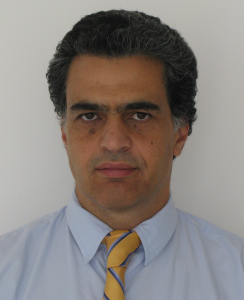 |
Professor Petros G. Voulgaris received the Diploma in Mechanical Engineering from the National Technical University, Athens, Greece, in 1986, and the S.M. and Ph.D. degrees in Aeronautics and Astronautics from the Massachusetts Institute of Technology in 1988 and 1991, respectively. Since 1991, he has been with the Department of Aerospace Engineering, University of Illinois where he is currently a Professor (also appointments with the Coordinated Science Laboratory, and the department of Electrical and Computer Engineering.) His research interests include optimal, robust and distributed control and estimation; networked control; applications of advanced control methods to engineering practice including, power systems, air-vehicle, nano-scale, robotic, and structural control systems. Dr. Voulgaris is a recipient of several awards including the NSF Research Initiation Award, the ONR Young Investigator Award and the UIUC Xerox Award for research. He has also been a Visiting ADGAS Chair Professor, Mechanical Engineering, Petroleum Institute, Abu Dhabi, UAE (2008-10). His research has been supported by several agencies including NSF, ONR, AFOSR, NASA, and Boeing. He is also a Fellow of IEEE. |
Distributed and Structured Control: The Impact of Youla-Kucera Parametrization
Abstract:
Distributed control has been the subject of tremendous research activity over the last 15 years, driven by the rapid advances in computing, sensing, actuating, communicating and networking technologies. As systems have become strongly interconnected and highly complex, the demand of efficient distributed control and coordination algorithms has greatly increased. Utilization of such algorithms span the space of numerous applications: groups of autonomous vehicles of all kinds, satellite constellations, micro-electro-mechanical systems (MEMS), manufacturing lines, chemical processes, power grid, transportation, water management and general infrastructure systems, just to mention a few.
The parametrization of all stabilizing controllers by Youla et.al. and Kucera was the key in the 80’s development of input-output methods for analysis and design of centralized control systems to provide guaranteed robustness and optimality. While interest in these functional analytic methods was subsequently decreased due to the rise of popular state-space methods (e.g., LMI’s), these input-output approaches have become important over the recent years in the context of distributed control. In this talk, we present these recent developments which allow for tractably solving several classes of structured and distributed control problems, from Quadratic Invariant to Mean Field, and also discuss the challenges of their implementability and scalability, as well as extensions to nonlinear problems.